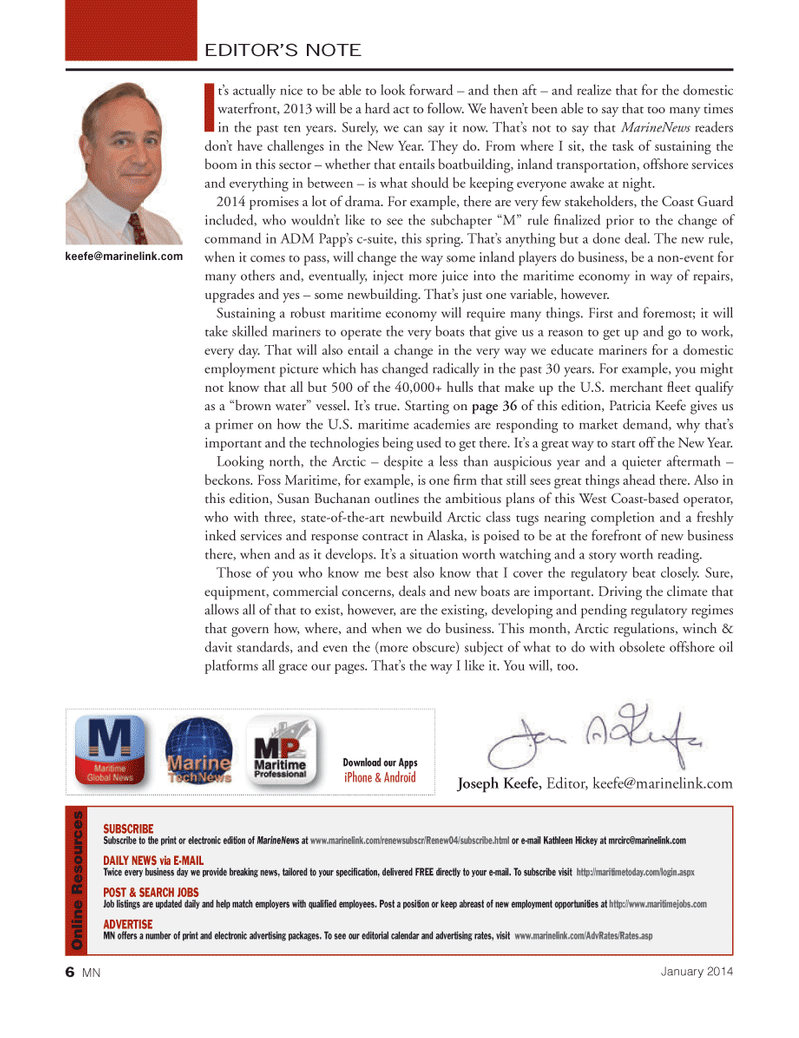
Page 6: of Marine News Magazine (January 2014)
Tug Boat Technology
Read this page in Pdf, Flash or Html5 edition of January 2014 Marine News Magazine
SUBSCRIBE
Subscribe to the print or electronic edition of MarineNews at www.marinelink.com/renewsubscr/Renew04/subscribe.html or e-mail Kathleen Hickey at [email protected]
DAILY NEWS via E-MAIL
Twice every business day we provide breaking news, tailored to your specifi cation, delivered FREE directly to your e-mail. To subscribe visit http://maritimetoday.com/login.aspx
POST & SEARCH JOBS
Job listings are updated daily and help match employers with qualifi ed employees. Post a position or keep abreast of new employment opportunities at http://www.maritimejobs.com
ADVERTISE
MN offers a number of print and electronic advertising packages. To see our editorial calendar and advertising rates, visit www.marinelink.com/AdvRates/Rates.asp
Online Resour ces
EDITOR’S NOTE
I t’s actually nice to be able to look forward – and then aft – and realize that for the domestic waterfront, 2013 will be a hard act to follow. We haven’t been able to say that too many times in the past ten years. Surely, we can say it now. That’s not to say that MarineNews readers don’t have challenges in the New Year. They do. From where I sit, the task of sustaining the boom in this sector – whether that entails boatbuilding, inland transportation, offshore services and everything in between – is what should be keeping everyone awake at night. 2014 promises a lot of drama. For example, there are very few stakeholders, the Coast Guard included, who wouldn’t like to see the subchapter “M” rule fi nalized prior to the change of command in ADM Papp’s c-suite, this spring. That’s anything but a done deal. The new rule, when it comes to pass, will change the way some inland players do business, be a non-event for many others and, eventually, inject more juice into the maritime economy in way of repairs, upgrades and yes – some newbuilding. That’s just one variable, however.
Sustaining a robust maritime economy will require many things. First and foremost; it will take skilled mariners to operate the very boats that give us a reason to get up and go to work, every day. That will also entail a change in the very way we educate mariners for a domestic employment picture which has changed radically in the past 30 years. For example, you might not know that all but 500 of the 40,000+ hulls that make up the U.S. merchant fl eet qualify as a “brown water” vessel. It’s true. Starting on page 36 of this edition, Patricia Keefe gives us a primer on how the U.S. maritime academies are responding to market demand, why that’s important and the technologies being used to get there. It’s a great way to start off the New Year.
Looking north, the Arctic – despite a less than auspicious year and a quieter aftermath – beckons. Foss Maritime, for example, is one fi rm that still sees great things ahead there. Also in this edition, Susan Buchanan outlines the ambitious plans of this West Coast-based operator, who with three, state-of-the-art newbuild Arctic class tugs nearing completion and a freshly inked services and response contract in Alaska, is poised to be at the forefront of new business there, when and as it develops. It’s a situation worth watching and a story worth reading.
Those of you who know me best also know that I cover the regulatory beat closely. Sure, equipment, commercial concerns, deals and new boats are important. Driving the climate that allows all of that to exist, however, are the existing, developing and pending regulatory regimes that govern how, where, and when we do business. This month, Arctic regulations, winch & davit standards, and even the (more obscure) subject of what to do with obsolete offshore oil platforms all grace our pages. That’s the way I like it. You will, too. [email protected]
Joseph Keefe, Editor, [email protected]
Download our Apps iPhone & Android 6 MN
January 2014
MN JAN14 Layout 1-17.indd 6 12/20/2013 4:43:09 PM

 5
5

 7
7
